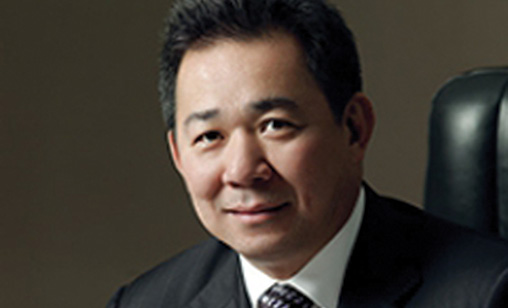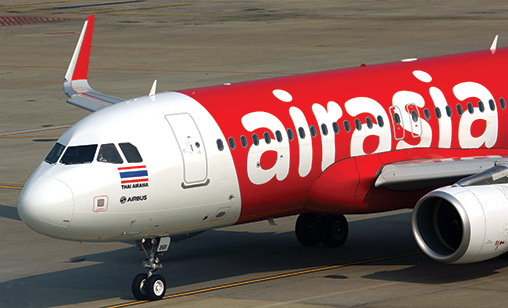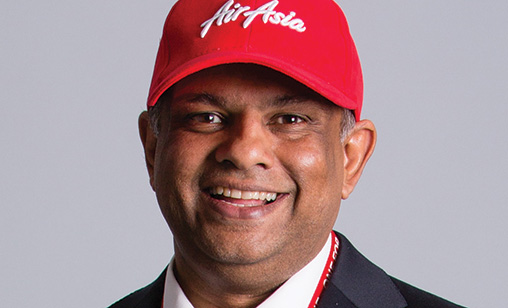News Backgrounder
Evolution rather than revolution at Thai AirAsia
A new shareholder at an airline often means a new strategy. But not at Thai AirAsia. Founder and chairman of the King Power International Group, Vichai Srivaddhanaprabha, promises it will be steady as she goes at the Bangkok-based budget airline now that he has bought into the low-cost carrier.
September 1st 2016
Thai tycoon and owner of English Premier League champions, Leicester City, Vichai Srivaddhanaprabha, told Thai media he will adopt a “hands off” approach to his latest business acquisition, Thai AirAsia (TAA). Read More » Instead, he will identify synergies between the budget carrier and his other business interests.
The founder chairman of Thailand’s only duty-free store chain, the King Power International Group, told media: “I have always been interested in aviation businesses. We owned five per cent of Nok Air when it was launched, but the stake was too small to make a difference.”
 |
But he is in a very different position now. With his recently acquired majority equity in TAA’s holding company, Asia Aviation (AAV), Vichai can combine the strengths of his retail and tourism empire with the expertise and affordable fares of Thailand’s most successful LCC.
“Thai AirAsia will add routes in China (the major market of both companies) and bring tourists to shop at King Power,” he said.
The 58-year-old tycoon, who is best known outside Thailand for his ownership of 2016 English Premier League winners, Leicester City, said in a recent briefing that he may have the power to change management, but that it won’t be happening. “We want to see TAA’s management maintained,” he explained, and added he has no doubts about the talent of TAA’s team.
Vichai purchased his TAA holding from the Tassapon Bijleveld family in June this year for US$227 million, with Tassapon retaining five per cent of the carrier in the deal. Tassapon will retain his position as TAA’s chief executive.
“Rest assured management, myself included, will continue the good work TAA always has done. The same team of executives and I will continue to manage the airline. We remain committed to growth just as we did when we launched 13 years ago,” Tassapon said.
TAA is on track to increase its A320 fleet from 48 to 51 by December and is forecast to carry 17 million passengers by year end. The LCC has 15 A320-200s on order. Last year, TAA carried 14.8 million passengers and reported a profit of $30 million.
Vichai’s acquisition has received the corporate blessing of Tony Fernandes, AirAsia Group CEO, whose group retains 45% of TAA. “This investment proves that Thai AirAsia’s value proposition remains undiminished. The vote of confidence that comes from one of the most successful family businesses is fantastic,” Fernandes said.
“The potential tie-ups between AirAsia and King Power, Thailand’s sole duty-free operator, are massive. We look forward to working together, not only in Thailand but across the group and Asean.”
| 'Thai AirAsia will add routes in China - the major market for the airline and the duty free retailer - and bring tourists to shop at King Power' |
So who is this relative newcomer to Asian airline ownership? Back in 2007, Vichai was ranked 21st in the Forbes’ list of Thailand’s wealthiest businessmen with net worth of $200 million. Today, he is ranked fourth, with a fortune of $2.8 billion. He founded his duty-free retail company, King Power, in 1989 with the opening of his first store, selling Thai handcrafts, in Mahatun Plaza in central Bangkok.
He later opened a pick-up point for customers at Don Mueang airport, then Thailand’s international airport. It was a significant step for the retailer as it was the only company allowed to sell duty free goods at the airport.
Vichai’s fortunes really took off in 2001 with the election of Thai Telecoms tycoon, Thaksin Shinawatra, as the country’s prime minister. Thaksin’s pet project was the construction of Bangkok’s Suvarnabhumi Airport, which opened in 2006.
Vichai was awarded exclusive rights to operate duty free outlets at the new airport, a right observers said at the time was a licence to print money. He is known to have powerful connections with Thailand’s elite and with its revered royal family. He has donated millions to charities supported by Thai royalty. At one stage had millions of yellow armbands printed which read “We Love HM the King” to mark the 60th anniversary of King Bhumibol’s reign, reported author MacGregor Marshall.
According to one local commentators, Vichai’s connections allowed King Power and its chairman to survive during the political unrest of 2006 to 2008 in Thailand. In those years Thaksin was removed from office in a coup and a pro-Thaksin party was elected in 2007. The political climate heated up with the rise of the anti-Thaksin Yellow Shirt movement in 2008 that saw protesters occupying the city’s Suvarnabhumi Airport as well as Phuket’s airport.
 |
| The Bangkok-based LCC plans to have a fleet of 51 A320s by year end |
Like many Thais, Vichai is an avid supporter of English soccer, but when he paid $55 million for Leicester City in 2010 it was a second tier team. After the team’s promotion to the Premier League in 2014 he said he would spend $240 million to break into the top five clubs within three years. He beat his own deadline by 12 months.
Also a polo enthusiast, Vichai and his polo playing son, Top, often arrive at Leicester’s home games by helicopter and have the pitch blessed before kick-off by monks flown from Thailand for the occasion.
TAA already is performing well, but the combination of the LCC and the duty free empire could be a potent mix. TAA claims it is one of the leading airlines operating scheduled flights between Thailand and China, with 20% of its revenue generated by the Chinese market. Both TAA and King Power say it is not difficult to see how an alliance with TAA will promote King Power’s retail business in China.
An estimated 10 million Chinese visited Thailand last year, with most of them having direct exposure to KPIG’s duty free stores at the country’s two main Bangkok airports and regional airports at Phuket and Chiang Mai. The duty free retailer also has three dedicated anchor stores in Bangkok.
TAA flies to all of these destinations and also directly between Thailand’s regional airports and Chinese destinations. From Bangkok it serves Changsha, Chongqing, Guangzhou, Hangzhou, Kunming, Nanchang, Shenzhen, Wuhan and Xi’an, as well as Macau and Hong Kong.
TAA also flies to Yangon and Mandalay in Myanmar, where King Power is planning to open duty free stores. Analysts said the ability to deliver duty free goods directly to Chinese passengers travelling with TAA and offer cross incentives with the airline and its potentially captive customer base is a huge opportunity.
 |
| AirAsia Group retains 45% of Bangkok budget carrier, Thai AirAsia |
Growth also is forecast to increase from outside the region. TAA’s long-haul budget airline, Thai AirAsia X (AAX) has been aggressively expanding its network, bringing in more tourists to the KPIG’s retail ambit.
It flies six A330s to more than 20 regional and 29 international destinations from Bangkok’s Don Mueang International airport. In June, it launched flights to Muscat in Oman. In 2015, 85,000 tourists visited Thailand from Oman, according to figures from the Tourism Authority of Thailand. The numbers are projected to rise above 10% to 100,000 in 2017. Also in June, AAX started direct flights to the Iran’s capital, Tehran.